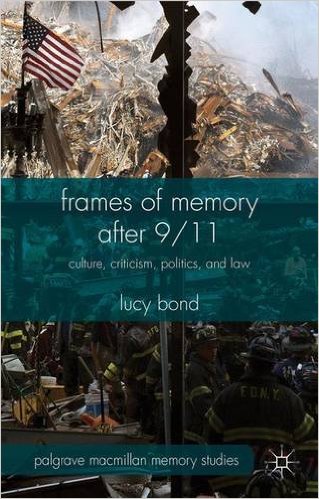Lucy Bond, Frames of Memory after 9/11: Culture, Criticism, Politics, and Law (Palgrave, 2015)
 Offering the most sustained analysis of the commemoration of 9/11 to date, Frames of Memoryprovides a detailed overview of American memorial culture from September 11, 2001 to the present. Examining diverse media of remembrance, from Acts of Congress to museum exhibits, the military commissions at Guantánamo Bay to the corpus of 9/11 fiction, Lucy Bond argues that, whilst narratives of the attacks have taken many forms and served multiple agendas, certain frames of memory have come to dominate the commemoration of 9/11 in the American public sphere, generating the artificial impression of a unified national response to these events. Highlighting three templates that have proven particularly powerful in shaping the representation of September 11 and its aftermath across cultural, critical, political, and juridical discourses (the rhetoric of trauma; the American jeremiad; and a paradoxically nationalistic cosmopolitanism), Bond traces these paradigms to their origins in American cultural history, interrogating the means by which frames of memory acquire hegemonic weighting as they are naturalised by their remediation over time.
Offering the most sustained analysis of the commemoration of 9/11 to date, Frames of Memoryprovides a detailed overview of American memorial culture from September 11, 2001 to the present. Examining diverse media of remembrance, from Acts of Congress to museum exhibits, the military commissions at Guantánamo Bay to the corpus of 9/11 fiction, Lucy Bond argues that, whilst narratives of the attacks have taken many forms and served multiple agendas, certain frames of memory have come to dominate the commemoration of 9/11 in the American public sphere, generating the artificial impression of a unified national response to these events. Highlighting three templates that have proven particularly powerful in shaping the representation of September 11 and its aftermath across cultural, critical, political, and juridical discourses (the rhetoric of trauma; the American jeremiad; and a paradoxically nationalistic cosmopolitanism), Bond traces these paradigms to their origins in American cultural history, interrogating the means by which frames of memory acquire hegemonic weighting as they are naturalised by their remediation over time.
In so doing, this book poses a series of urgent questions about the ethical and political factors at stake in the work of memory, asking: why, and with what consequences, commemoration becomes an ideological endeavour; in what ways the academic discipline of memory studies influences contemporary memorial practice, and vice versa; and how we should understand the complex relationship between memory, law, and justice in the wake of historical atrocity. Proposing a concomitant reframing and deframing of the events of September 11 and their aftermath, Bond ultimately seeks to open the American public sphere to a more diverse montage of memory, encouraging a globally-oriented engagement with the recent past.
Lucy Bond has produced a compelling analysis of the post-9/11 literary and legal cultures that draw upon and stretch the limits of the conventions of memory studies (and above all trauma studies) in place at the time of the event. Her book will appeal to those seeking a clear and comprehensive overview of the topic, as well as to readers already invested in the detailed study of the effects of 9/11, to whom she offers many new insights.
– David Simpson, UC Davis


The Institute for Modern and Contemporary Culture
University of Westminster Department of English, Linguistics and Cultural Studies
32-38 Wells Street, London W1T 3UW. United Kingdom.
